#primaries and caucuses
Text
heyyyyy babygirl i am back (saying this to the us embassy in bangkok thailand)
7 notes
·
View notes
Text
#this is what the progressives had failed to respect and appreciate in 2016#primary election is a much more manipulative popularity contest than a general election#primary election is a momentum contest and by nature a great deal of party faction coercion takes place#primary elections were never the same as general election that a single day outcome would seal the fate#Bernie sanders had to prove his worth through voters and caucuses and party shifting interest#and in 2016 the entire democratic primary election was undermined by facebook and Cambridge analytica into an unlawful manipulation of the#public opinion with headquarter email server hacking and subversive social media user fakenews psyop#people completely failed to recognize the crime committed in hacking dnc and then letting facebook distort their sentiments#taiwantalk
1 note
·
View note
Text
Why Voting For Nikki Haley To Stop Donald Trump Will Fail
There is a rational albeit flawed movement within never trump conservative circles who desire Democrats & Independents to register as Republicans & stop Donald Trump in the GOP Primaries.
Note: Featured image of Nikki Haley via Britannica.
One of those states is New Hampshire, where unaffiliated voters make up a plurality of the electorate and can participate in the primary of their choice.…
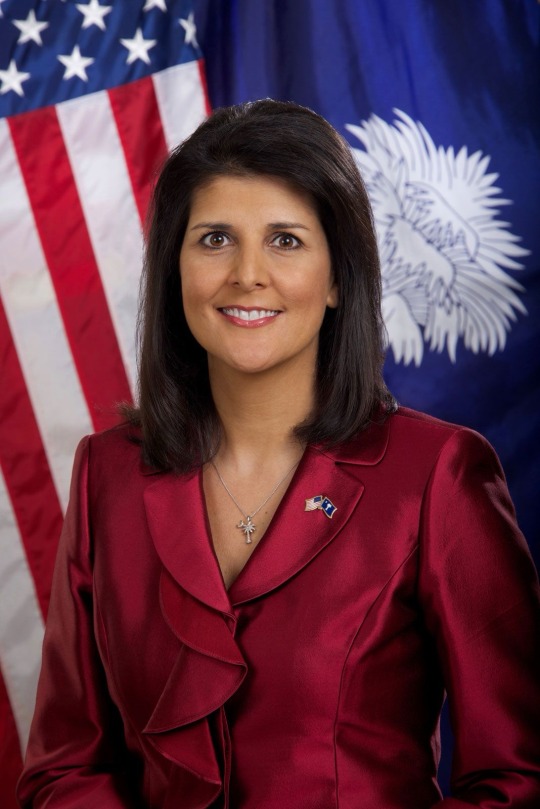
View On WordPress
#Caucuses#Democrats#Donald Trump#Elections#GOP#Independents#Iowa#Nevada#Never Trump#New Hampshire#Nikki Haley#Politics#Primaries#Republicans#South Carolina#Trump#United States#Voting
0 notes
Text
Who is Tim Walz?
Kamala Harris has apparently picked Tim Walz as her running mate. He seems good, based on his record. He's also responsible for the widely spreading "Republicans are weird" meme I've seen quite a lot of.
He has a good record. Just like I did for Kamala Harris in a post that has become quite popular, I will do a simple review of things I like from Tim Walz' political history. Again, as with Harris, this is just from his Wikipedia page. Let's go!
House of Representatives
Opposed increasing troop numbers in Iraq
Co-sponsored a bill to raise Minnesota's minimum wage
Voted for stem cell research
Voted to allow Medicare to negotiate pharmaceutical prices
Voted against the act to Prohibit Federally Funded Abortion Services
Voted to advance the ACA
Has received a 100% rating from many progressive organizations like Planned Parenthood and the ACLU
Was a member of several caucuses, including the LGBT Equality Caucus
Governor of Minnesota
Signed into law police reforms after the murder of George Floyd
Had Minnesota join the National Popular Vote Interstate Compact, meaning that all of the state's electors will vote for whichever candidate wins the popular vote nation-wide.
Under his governance, Minnesota passed laws for requiring paid leave, banning non-compete agreements, cannabis legalization, abortion rights, universal free school meals,
Political stances
Pro cannabis
Against bailout bills that loan taxpayer money to large banks and auto manufacturers
Was a former teacher for many years, and is very pro-education and supporting public schools. He is against merit pay for teachers (this is a good thing), and supports lowering tuition costs
Used to be pro-gun, but after Parkland he changed his mind, and as Governor he signed a bill mandating universal background checks
Pro-LGBT - has voted for LGBT rights many times, including as Governor, where he signed bills banning conversion therapy and protecting gender-affirming care
Supports veterans rights and support
Supports abortion rights and women's rights
I am going to copy-paste the entire section for his views on the Israel-Hamas war, because I don't want people claiming I am taking anything out of context. Overall, he has views that echo my own in many ways:
Walz condemned Hamas's October 7 attacks in Israel and ordered flags to be lowered to half mast in the following days. After the 2024 Minnesota Democratic presidential primary, in which 19% of voters cast "uncommitted" ballots, Walz took a sympathetic view toward those doing so to protest President Biden's handling of the war in Gaza, calling them "civically engaged".
Of the protests against U.S. funding of the war in Gaza, Walz said: "This issue is a humanitarian crisis. They have every right to be heard... These folks are asking for a change in course, they're asking for more pressure to be put on… You can hold competing things: that Israel has the right to defend itself, and the atrocities of October 7 are unacceptable, but Palestinian civilians being caught in this… has got to end." Walz also said he supports a ceasefire in Gaza.[100]
291 notes
·
View notes
Text
This is going to be a fucking nightmare. Basically, Democratic primaries and caucuses have already been held in most states, and Biden was the nominee chosen by voters. Any Republican-held state legislature can argue that by swapping in a candidate AFTER the vote has been made, the Democratic Party is countermanding the will of the people.
This'll probably go to the Supreme Court and...well, we'll have to see, then. Kamala Harris is at least his running mate; they can argue she's already on the ticket because of that. Also, due to campaign finance rules, she's the only one who can access his campaign funds, which is significant.
Get right with Kamala, now. It's got to be her.
32 notes
·
View notes
Note
Fascinating to watch people's fanfic about how things work with the DNC and delegates. How the delegates vote and who they can vote for is determined by the individual states' primaries and caucuses.
Literally the only person who could take Biden's place is Harris. She's the only person who can legally inherit the war chest. But people aren't ready for that conversation. So if they're not willing to ride for Biden/Harris, go ahead and bite down on the cyanide capsule. Otherwise they just need to shut the fuck up.
I think we all want them to shut the fuck up.
29 notes
·
View notes
Text
Look. I know you're angry. Furious, even; that this is what we have to work with, that we're stuck in this position again and again, that our will never seems really to be heard, much less done. And I get it. I was angry (nay, furious), too, in 2016. I was FURIOUS that my excitement for the future was purposefully derailed and my primary vote literally BURNED or 'lost', so that we couldn't get Bernie, the most Progressive and promising candidate ever in US history, to run against Trump; because it seemed he would have been a shoo-in. That I was forced to vote for Hillary instead, because in comparison she seemed so flawed. That I had to go with the 'lesser of two evils' option. That my vote wasn't good enough for the Dems in the primary, got flushed away like it was nothing, only for them to come back and beg me for my vote a couple months later. "If they didn't want my vote in the primary, they can't have it now", I said.
I also didn't actually believe that the Orange Menace, Cheeto Voldemort, could actually ever be electable. I knew he was worse than Hillary could ever be... but I truly believed that enough people were either deeply pro-Hillary or would vote for her as a matter of necessity that they didn't actually need my vote. I thought that if we managed to get a Black man elected, IN THE US, *TWICE*--if we motivated enough voters, did enough caucusing, mobilized enough callers and got enough people registered (and i did it all, even after losing the Bush/Gore one), we would have no real trouble getting a white woman from US political royalty with relatively conservative views in the big seat. I still believed in that momentum, that beauty we found during Barack's first run. Anything was possible, so why worry, really?
I couldn't in good conscience abstain, but surely voting my conscience with a third party candidate wouldn't hurt anything, really. Not with a Dem powerhouse on the ballot, right?
And then it happened. The impossible, the unthinkable. The ableist, racist-dogwhistle idiot with the speaking ability of a chimp, with a cadre of absolute morons at his back, actually got himself elected. (Sort of. Or even that he could cheat the system enough to slide by, which was even more frightening.) And I knew I had made a terrible mistake, and so did enough others as to help to cause this insanity to happen. That night, clinging to my then-wife with my heart in my throat at how close it was, terror rising in me... I would have taken it back in a microsecond.
But i couldn't. And you won't be able to either. And this time we are fully aware that it could happen again. That it will be worse this time.
TBC
#us politics#kamala harris#cheeto voldemort#project 2025#vote blue#vote cuz your life literally depends on it#for the world
24 notes
·
View notes
Text
I'm gonna need everyone to get real savvy and real skeptical real fast about political polls and election models in the next 4 months. News organizations are starting to grasp for polling numbers to understand how Kamala Harris will match up against Trump, and I need you all to remember and repeat this maxim:
Electoral opinion surveys and preference polls are not useful without precedents.
The media is going to turn to them because they are desperate for narratives and we are going to be starved of information up until votes get counted.
Do not be misled; the media are effectively running to soothsayers. Both if polls show Kamala doing well, and if they don't.
Here's the thing you need to understand about election polls in the US. Predicting a winner in a presidential election is extremely nontrivial, because of the Electoral College. Outcomes depend on margins in a handful of states; this is why you see organizations like 538 talking about the "Path to 270" and the make-or-break states for individual candidates. A huge fraction of American voters live in California, and their preferences largely don't matter statistically, since California always votes blue. So a straight random poll of Americans will always show the Democrat ahead, because so many Americans live in California and New York (yes this is also why the Electoral College sucks).
To counter this trend, pollsters will use statistical models to adjust the polling sample, trying to guess at who will vote in which state, and rebalancing their polling sample (often by applying statistical weights) to try to get a more accurate sense of how the race will actually break.
So right off the bat, that introduces a serious degree of uncertainty. Good pollsters account for that in the poll's margin of error (not that the media ever let a margin of error get in the way of a narrative), but estimating the margin of error due to statistical weights itself relies on statistical models. Pollsters look at past elections and the variability in turnout relative to polling results (since there are polls that try to measure turnout specifically) to build a model for how uncertain their turnout predictions are.
And that is the key point here. A presidential election opinion poll rests entirely on a prediction of future voter behavior based on past behavior.
That works fine in normal elections with normal candidates. This was not a normal election before Biden dropped out, and it certainly is not one now. No major party's candidate and presumptive nominee has dropped out after the main nominating contest. Not since the advent of the modern party system with primaries and caucuses that are open to the average voter. No major party has fielded a campaign for the presidency during a standard election year in only 15 weeks. Ever.
We do not know what impact that will have on voter turnout, in any demographic or in any region. We have no precedent for this.
So if someone tries to sell you a narrative about how the election is going? They are lying to you in order to sell you a narrative, either for propaganda reasons (a campaign) or financial reasons (a for-profit media enterprise).
I know it is tempting to grasp at every straw of information to understand how the campaign is going. Trust me, I have 3 weather forecast apps and 4 weather radar apps on my phone. I know how compelling it is to want to know what's happening and what will happen.
The best we can do is have conversations with the people in our lives who are not convinced they want to vote for Kamala Harris or aren't convinced they want to vote, and honestly and earnestly get them to come out to vote. Doesn't matter what state you vote in. Don't let historical precedents that do not apply dictate your actions. Have those conversations.
And for fuck's sake, ignore the media pundits losing their minds trying to fill the airwaves with predictions. They don't know what's going to happen any more than you do.
21 notes
·
View notes
Text
PLEASE REPOST ♥️
CALL TO ACTION:
Write in or vote “uncommitted” at your state’s primaries
instagram
Even if you plan on voting for Biden or don’t plan on voting at all, please join me in writing in/declaring yourself “uncommitted” at local caucuses or upcoming primary in protest of Biden’s participation in genocide.
“None of us want Trump to win, which is exactly why we’re doing this. This is the only way that we can raise the flags to Democrats that you are going to lose unless you call for an ultimate ceasefire” -Gabriela Santiago-Romero of the Detroit City Council
This does NOT mean that you cannot vote for Biden in November.
All it means is that you are telling the DNC that you are not yet committed to Biden for his role in genocide!
Please spread the word to your friends & family both irl and on social media. You can also help out by handing out flyers or creating posters for the “uncommitted” campaign at your local polling place on the day of your primary.
Primary & caucus dates:
#vote Biden#Genocide Joe#Joe Biden#us politics#Palestine#Free Palestine#Free Gaza#strike for palestine#strike for gaza#jews for palestine#jews for ceasefire#jews for peace#christians for palestine#muslims for Palestine#catholic#Gaza#genocide#stop the genocide#.txt#vote blue no matter who#vote blue#us primaries#caucuses#caucus#uncommitted#uncommitted movement#Instagram#primaries
28 notes
·
View notes
Text
Current state of Vote Uncommitted
(Linked for data)
Only a few states have yet to hold primaries.
As of now, according to this data, over 794 Thousand primary votes have been uncommitted/uninstructed/none/etc
+794,000
+794k
And this isn't even counting all the people in states that lacked uncommitted options and had to vote write in, or vote for some random other democrat in protest, or left blank, etc. Since so many of those are also protest votes in line with vote uncommitted, I would add another 100-150k to the amount of protest votes Vote uncommitted has gotten so far.
The largest amounts of uncommitted votes are in crucial swing states, by margins that far exceed the tiny amount Biden won by in 2020.
And remember, these numbers are just people who go out to vote in primaries; It takes effort to do that.
Almost 4/5ths of a million Primary voting Democrats have gone out to tell Biden
1) fuck you
2) we are against your genocide
3) our votes for you are dependent on you changing course now and totally
4) We do not have faith in your ability to win while doing this and attacking your own supporters, so stop and change course now
And this is just the vote uncommitted campaign; There are also the many, many, many major dedicated lifelong democrat donors and fundraising organizations that have signed letters and statements telling him to change course because they either can't support this genocide or they know this will cost him the election if he doesn't change course now, as well as those who have cut of funding for the same reasons, and those who did both and more.
here's a fun little quote to keep in mind
When you look at the smallest popular vote shift needed to give Trump a victory, the 2020 election was close. Indeed, it was even closer than 2016. If Trump picked up the right mix of 42,921 votes in Arizona (10,457), Georgia (11,779), and Wisconsin (20,682), the Electoral College would have been tied at 269 all. The House would have then decided the election. Republicans will hold the majority of state delegations in the new Congress, and they undoubtedly would have chosen Trump.
If Trump had also picked up the one electoral vote in Nebraska’s Second Congressional District, which he lost to Biden by 22,091 votes, he would have won the Electoral College outright.
-CFR
#us politics#vote uncommitted#2024 elections#2024 presidential election#2024 primaries#biden administration#joe biden#campaign finance#2020s election was effectively decided by less than 50k votes
15 notes
·
View notes
Photo
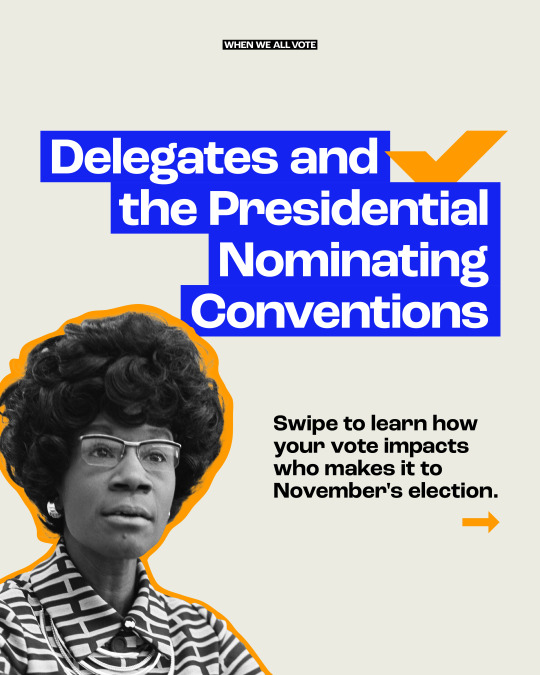
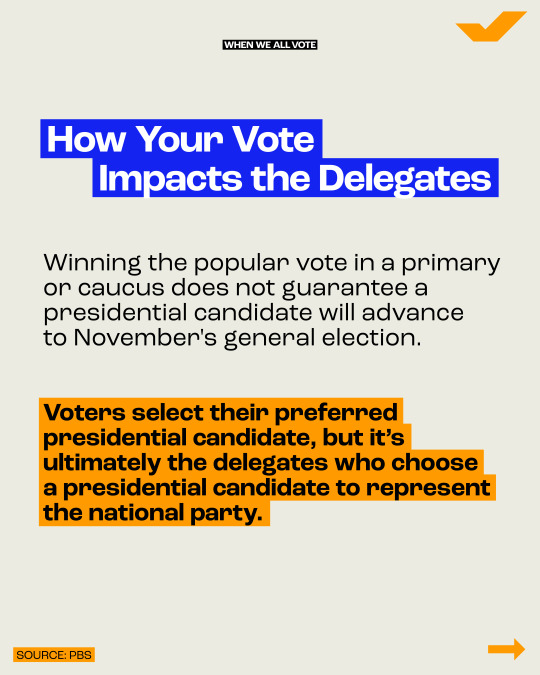
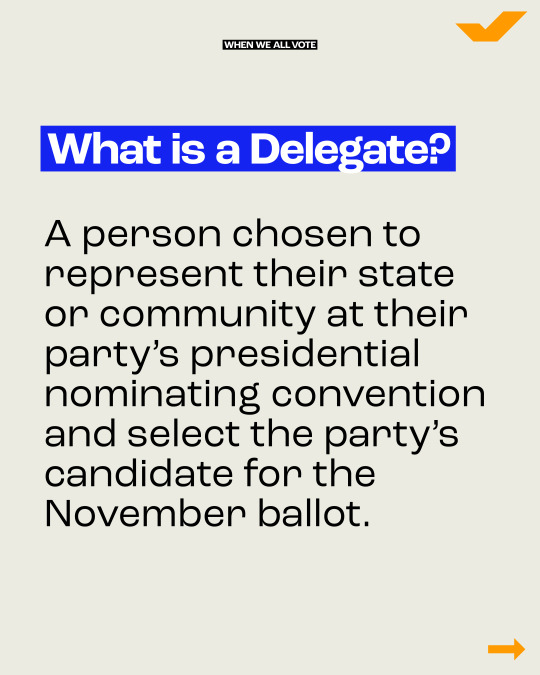

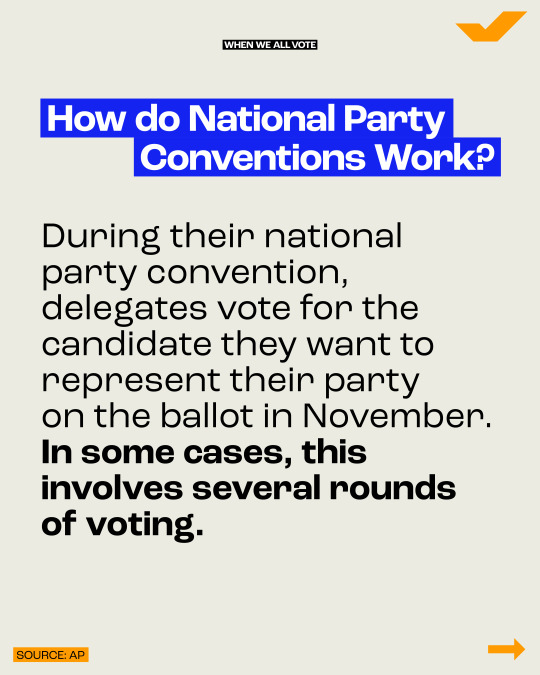
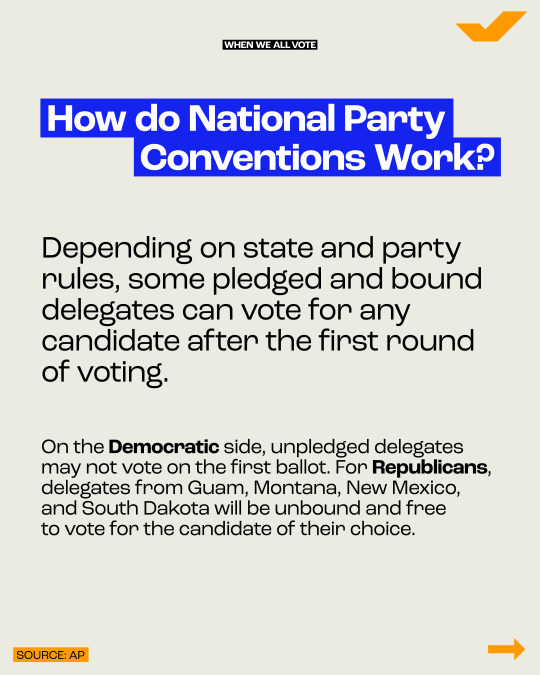
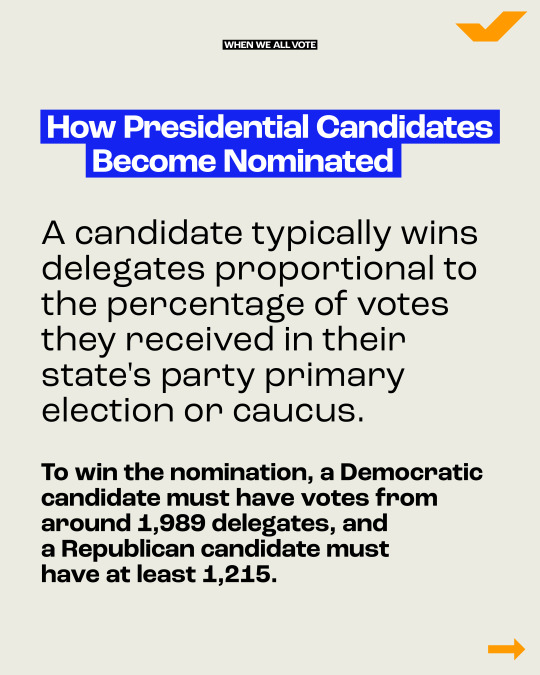
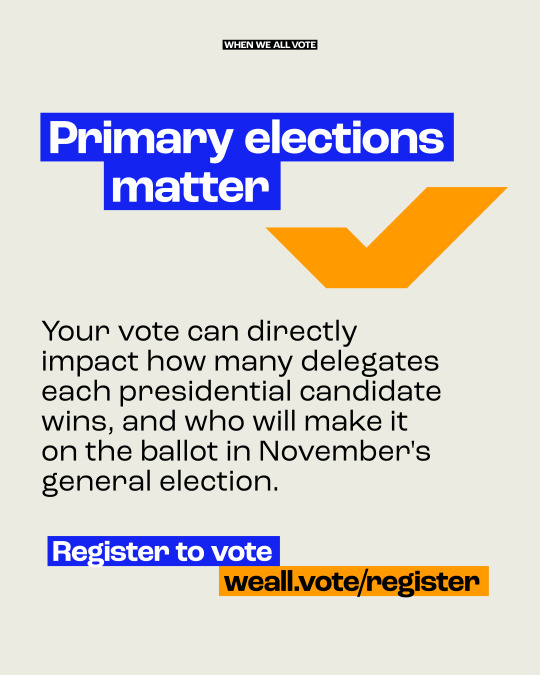
Did you watch Shirley on Netflix and wonder how political parties select their nominee for President? 🤔
Voters participate in primaries or caucuses at state-level party conventions in order to select the delegates who represent their community at their party's presidential nominating convention. At the convention, delegates ultimately select a candidate to represent their party on the November ballot.
Swipe to learn more about delegates, national party conventions, and how YOUR vote in a primary election impacts who you’ll see on the ballot in November. Then, visit weall.vote/register to make sure you’re registered to vote! 🗳️
#shirley#shirley chisholm#shirleynetflix#president#vote#voting#primary#primaries#caucus#convention#national party convention#delegates#election#general election#register to vote
15 notes
·
View notes
Text
like in any given one of these posts I kind of reblog them as a means to spread information as opposed to endorsing it basically. You have to make your own decisions with regards to politics and what you'll do with what you have but I do believe that the democrats are toothless liars who have brought themselves and all of us to this point because they're so shit at actually making progress. I think the Republican Party is overall worse as they are claws out about their truths, which are bad, however the United States of America is an entity of global tyranny and that needs to be known either way because that greater horror eclipses the party identities. Also everyone who's getting into learning about politics desperately needs to look up how these elections actually work
Pay attention to these people and your local elections, as there are seats up for election again and these seats can shape a lot. I like to check reps based on certain specific policies and then based on their donors. Donors tell you a lot about what they’re actually trying to do
#luna.txt#this is mostly going out to people who actually will vote and who want to try to exercise this#I am not about to tell you what to do#I'm just a personal fan of doing what I can
5 notes
·
View notes
Text
For my US friends—remember that while a few primaries/caucuses have happened most haven’t. So make sure you have a plan to cast your ballot if you want a say in general election candidates. (For every race, obviously, not just the presidential election)
Also. Just a PSA. Please do your research and vote in your state and local elections. Yes, presidential and congressional/senate races matter too, but local and state officials can have a BIG say in our lives, too.
Remember to register to vote if you’re not already. Look up your state’s rules on voting and do it because some states have really specific rules on this stuff.
I know it’s tedious. I know it’s annoying. I know I sound preachy. But voting is one of the most important and powerful tools we have to make our voices heard.
17 notes
·
View notes
Text
12 notes
·
View notes
Text
Most presidential election years advance as follows. There are lots of primaries, someone in each party wins the most and takes center stage at a big raucous convention, they run in the general election, someone wins 270 votes in the Electoral College and becomes president.
But 2024 is no normal presidential election year. The two leading candidates for the major party nominations are the oldest pairing of candidates in American history — one is 81, the other is 77. Age appears to be a major factor in the fortunes of the incumbent president even though he has the kind of record that would re-elect most presidents. The other candidate is under indictment and could be convicted of a crime and head to jail in the election year. The two major parties are so closely divided that third party candidates could swing the Electoral College votes of a state — resulting in the third election in the 21st century where the national vote winner does not win the Electoral College vote and thus the presidency.
It is no wonder that lots of Americans are asking, “What happens if the candidate is incapacitated, drops out, goes to jail, or if no one reaches 270 in the Electoral College vote count?” The answer is that the election could be decided by approximately 10,000 people who no one has ever heard of.
So, here’s who they are.
First, we need to understand the importance of political parties. For example, a great deal of attention has been paid to the fact that officials in Colorado and Maine have recently decided that Trump is ineligible to appear on the Republican primary ballot in their state because of his role in the January 6 insurrection. If these decisions stand (a big if) it could have huge consequences in November but no consequences at all for the nomination race. That’s because political parties control the nomination process. They are covered by the First Amendment’s freedom of association and short of processes that violate other civil rights (all-white primaries, for instance) the state political parties can select delegates to their conventions pretty much any way they want to. The Republican parties of Colorado and Maine can elect delegates at their state convention or by their state committee and send them to Milwaukee to vote for Trump at the Republican convention.
For instance, in the event of the death or incapacitation of a candidate, each state party will continue to elect delegates to their conventions in a series of congressional district caucuses, state conventions, and state committee meetings that will occur most often in April, May. and June. Delegates elected in the name of someone who is no longer a candidate will become uncommitted. Candidates who step into the breach hoping to take the place of the fallen candidate will find out who these delegates are and woo them in as many ways as they can. The outcome will be a convention where the result may not be known ahead of time. In other words, it will be the kind of no-holds-barred event that nominating conventions held between 1831 and 1968.
All this is to say that the first 8,567 people you’ve never heard of are the people who will be delegates to the national conventions. These people can be teachers or labor union members or evangelical Christians or right to life activists. What they all have in common is some degree of activism on behalf of their political party, even if they generally are unknown to the public.
The dominant role of the political parties extends until after the convention as well. If something happens to the party’s nominee and that person can’t run in the general election, the 168 members of the Republican National Committee and 426 members of the Democratic National Committee will meet in special session to choose a replacement nominee. (No, the nomination does not automatically extend to the vice-presidential candidate on the ballot.) The procedures for this are written in the rules of the Republican Party and in the Charter of the Democratic Party. Most of these 594 people are elected in their states and include all the state party chairmen and vice chairmen as well as people who are prominent in their state and party.
Each party has a system of selecting its national committee members and its national convention delegates and methods for implementing the selection process. This is a large and complex undertaking, which is why it requires established political parties and millions of dollars to carry out. If one understands the centrality of the institutional party to the nomination process, one can also see why a group like No Labels is having such trouble figuring out how to nominate a candidate that (supposedly) the public wants and who is neither Trump nor Biden. Over many decades, the two political parties have established a system that has a kind of legitimacy to it. A group that decided to put forth a candidate without calling itself a political party and without building a grass roots of elected leaders will have a very hard time arguing that its nominee is legitimate.
And finally, what happens if, for some reason, the winner can’t take office after Election Day and before the final count in the Senate? The next critical group that no one knows consists of the 535 members of the Electoral College. Most people are familiar with the Electoral College and on election night we all watch as states announce who won and who lost their electors. But most people don’t realize that electors are actual real live people who travel to their state capitals on the first Tuesday after the second Wednesday in December. They have a real meeting where they sign a “certificate of ascertainment” and a “certificate of votes” which are sent to Washington, D.C. to be read and counted by the president of the Senate (the sitting vice president of the United States.) Some states (29) have statutes requiring the electors to vote for the winner of the election in that state. But others (21) do not.
Electors don’t often cast their votes differently from the election results. But in the case where the nominee is no longer alive, incapacitated, or on their way to jail, some of those electors may think differently and may try to vote for someone new. Electors are generally chosen by the state party for loyalty to the party. In many instances, it is an honor — a sort of gold watch — given for long-term service to the party. They are not expected to think for themselves or to negotiate, which is not to say that they wouldn’t under extraordinary circumstances.
And, of course, it is always possible that no candidates win 270 votes in the Electoral College. If that happens the election goes to 435 people in the House of Representatives. Some people know who their representative is but very few know who the other 434 representatives are. Once in the House — states have one vote each — determined by majority vote of their delegation — a crazy system in this day and age especially when the big states are so much more populous than the small states.
Once the Electoral College meets and makes its decision, if the winner can’t take office, the 20th Amendment to the Constitution states: “If, at the time fixed for the beginning of the term of the President, the President elected shall have died, the Vice President elect shall become President.”
Odds are that 2024 will proceed as expected. Trump and Biden will win the most primaries and be their party’s nominee. And one of them will go on to win the votes in the Electoral College and take control in January 2025. But it is important to understand that there are no guarantees 2024 will proceed along the usual course. There could be surprises along the way that will shock people and destabilize the system. The 8,567 convention delegates, the 594 members of the parties’ national committees, the 535 members of the Electoral College, and the 435 members of the House of Representatives add up to slightly more than 10,000 people. We are in uncharted waters on several fronts, and we should expect strange developments along the way. Ten thousand people who we don’t know could play a critical role in deciding how to deal with those surprises and determine the occupant of the most important office of the United States.
22 notes
·
View notes
Text
If You Can Vote in the U.S. (But Have Never Done So)
To vote in an election, you have to be registered to vote. Depending on the state, you may need to be registered X amount of days before the election.
Primary elections are held before the general election and are when the candidates for a party are chosen. (But some states do caucuses instead of primaries. I've never done a caucus before, so I can't speak to them personally.)
When primaries are held depends on the state. Some primaries have passed; others have not. Primaries aren't just for the president; legislators and govenors have them, too.
You may need to be a member of a political party in order to vote in that party's primary. (This depends, you guessed it, on the state.) Being a member of a political party doesn't come with membership fees or even a legal obligation to vote for that party's candidate in the general election.
The reason you might have to be a member of the party to vote in that party's primary is to prevent what's known as ratfucking. That's when one party is holding a primary but the opposing party isn't, so members of the opposing party vote in the other party's primary in order to choose a weak candidate their candidate will have an easier time defeating in the general election.
Okay, general elections! There's more than the presidency on the ballot. Some things that will or might be on the ballot are: House of Representatives, Senators, govenors, state level legislators, state Constitutional amendments, sheriffs, school board members, referendums to fund schools more, and judge recalls.
This is why it's good to vote every two years, not just every four.
Your ballot will not be invalid if you leave a race blank. You can ask for a new ballot if needed.
If you have any questions, please ask me. If I don't know, I'll know how to find that information.
5 notes
·
View notes